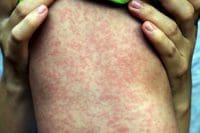A New Jersey hospital develops and implements a program to care for nurses.
Takeaways:
- The leadership team at a community hospital in New Jersey, a state with the nation’s second largest number of COVID-19 cases, implemented a direct approach to supporting frontline clinical staff during the pandemic.
- The plan included daily rounding by a psychiatric advanced practice nurse, recognition and referral for treatment of staff stress- and anxiety-related symptoms, and access to a wealth of hospital- and system-provided resources.
We know from the Handbook of COVID-19 Prevention and Treatment, compiled by frontline providers in China, that caregiver emotional sequelae to the pandemic may include anxiety, panic, distress, and powerlessness. At Chilton Medical Center in New Jersey, we developed an emotional support plan to help staff who are facing unprecedented sources of stress. The plan was informed by two articles; one by Chen and colleagues that discusses the mental health needs of staff in China when the virus was first identified, and another by Khalid and colleagues that describes the impact of the Middle East respiratory syndrome–related coronavirus outbreak in Jeddah, Saudi Arabia.
Stress points
Healthcare workers—nurses, providers, and support personnel—are experiencing severe stress while caring for patients infected with COVID-19. They carry the extra burdens of infection risk, equipment shortages, and sudden practice environment alterations (such as high-efficiency particulate air [HEPA]-scrubber machines, infusion pumps and tubing moved outside the patient’s door, new windows for maximum patient visibility and to observe personal protective equipment [PPE] donning and doffing). Some nurses are receiving condensed critical care training and administering previously unfamiliar medications and therapeutic regimens, leading to fear of making mistakes.
And because many ambulatory offices are closed, staff are being shifted quickly to the acute-care setting. and pushed out of their comfort zone to adjust to new managers, coworkers, and clinical partners, including physician locum tenens, agency/travel nurses, advanced practice registered nurses (APRNs), physician assistants, and certified registered nurse anesthetists with waived authorizations to work independently on COVID-19 positive units; some of the workers represent far-flung areas of the United States.
All of these factors compound any pre-existing anxiety condition, which is aggravated by overwhelming physical and mental exhaustion, stress from loneliness and isolation from their own families, dealing with death and dying in numbers not previously experienced by most staff, and worst of all, participating in allocation decisions about scarce resources, as hospital census surges exceed the norm.
The plan
The Chilton Medical Center plan includes frequent rounding by leaders and a psychiatric APRN, offering mental health tips, providing education about how to recognize the early warning signs of emotional distress and how to help staff who are grieving, deploying immediate psychological first aid, offering a respite program, and conducting a new daily “touch your heart” huddle.
Other strategies include daily telehealth/telepsychiatric appointments and spiritual care provided by a palliative care chaplain who checks in via FaceTime with the hospital’s designated priest who visits, anoints, provides end-of-life services, and prays with patients, families, and staff. Clergy of other denominations in the community are available by FaceTime or phone as needed. In addition, live streaming and recorded meditations, free apps, virtual workouts, mindfulness videos, Mental Health Moments (an internal program) in podcast format, and other support programs (meditation, exercise, dance, handouts, staff acknowledgment, and writing prompts provided by our poet-in-residence and the humanities educator) are available.
A Caring for the Caregiver newsletter and other unit-based resiliency programs are provided during rounding by the psychiatric APRN who is providing staff support during the COVID-19 crisis. (The first two newsletters can be downloaded here and here.) We dedicated a room for mindfulness and respite that’s been well received by all hospital team members. The psychiatric APRN attends unit-based huddles on all shifts, including weekends, and is accessible to everyone as a resource.
All of these strategies support the Atlantic Health System’s employee assistance program, as well as the Integrative Care and Creative Arts at Carol G. Simon Cancer Centers, the Healing Culture Council, and the Atlantic Health System Integrative Medicine Department.
The plan has helped reduce the psychological impact of caregiver stress. One nurse wrote, “I was so happy to see you on my unit. Thank you for all you have done…. It is because of you being here that has changed my life and [that I] am coping…as good as I am now. I appreciate you and please know you’ve made a huge impact here. Thank you from the bottom of my heart.” Another nurse said, “Just seeing you here makes me feel better—that you are here just for us gives me such comfort to get through the days ahead.”
Other organizations can apply some of the strategies from our plan (outlined below) to help support their staff during the COVID-19 pandemic.
Work plan to address staff stress
| Activity | Outcomes |
| Provide education Learn how to:
Modes of education for mental health awareness and self-care include:
|
|
Offer respite areas
|
|
Implement focused rounding and address immediate needs
|
|
Make stress-reducing activities easily available
|
|
| Ensure effective coronavirus-related communication to staff (Note: According to the literature, fear of personal safety and well-being of colleagues and family are staff’s primary concerns during a viral pandemic.)
|
|
Touch Your Heart daily huddles
The purpose of the Touch Your Heart huddles is to embody the spirit of Watson’s Theory of Human Caring. Chilton Medical Center adopted Jean Watson’s caring processes, and it forms the cornerstone of every caring moment between nurses and patients. The first process is “Embrace altruistic values and practice loving kindness with self and others.” Here is the format:
- Greeting: The leader (nurse manager or charge nurse) thanks staff and acknowledges any “bright spots.”
- Announcements: Nurse manager, charge nurse, and team members make announcements (such as number of patients with COVID-19 in the hospital, community resources, and construction projects).
- Staff “round the room”: Staff are asked to share questions, thoughts, and ideas.
- Summary of available resources: The leader provides a summary of mental health resources staff might need.
- Moment of silence: The leader asks, “Does anyone have someone or a particular team they’d like us to remember at this time?” The intent is to recognize all staff, patients, their families, our own families, and the entire community.
- Quote of the day: The leader provides the first quote at the initial huddle, but then the responsibility rotates among staff.
- End with: How can we exhibit caring to one another today?
The authors work at Chilton Medical Center, Atlantic Health System, in Pompton Plains, New Jersey. Mary Ann Donohue-Ryan is an executive nursing/healthcare consultant and advanced practice registered nurse in adult psychiatric-mental nursing. Maureen A. Schneider is the chief nurse and operations officer.
References
Center for the Study of Traumatic Stress. Sustaining the Well-Being of Healthcare Personnel During Coronavirus and Other Infectious Disease Outbreaks. cstsonline.org/assets/media/documents/CSTS_FS_Sustaining_Well_Being_Healthcare_Personnel_during.pdf
Chen Q, Liang M, Li Y, et al. Mental health care for medical staff in China during the COVID-19 outbreak. The Lancet. 2020;7(4):e15-16. thelancet.com/journals/lanpsy/article/PIIS2215-0366(20)30078-X/fulltext
Khalid I, Khalid TJ, Qabajah MR, Barnard AG, Qushmaq IA. Healthcare workers emotions, perceived stressors and coping strategies during a MERS-CoV outbreak. Clin Med Res. 2016;14(1):7-14.
Liang T, Yu L. Handbook of COVID-19 Prevention and Treatment. Hangzhou, Zhejiang, China: Zhejiang University School of Medicine; 2020. Researchgate.net/publication/339998871_Handbook_ofCOVID-19_Prevention_and_Treatment
Suicide Prevention Lifeline. Emotional wellbeing during the COVID-19 outbreak. 2020. suicidepreventionlifeline.org/current-events/supporting-your-emotional-well-being-during-the-COVID-19-outbreak


















